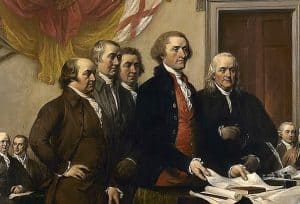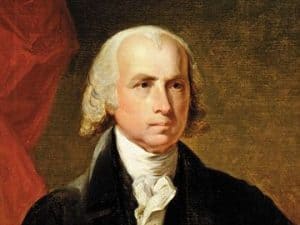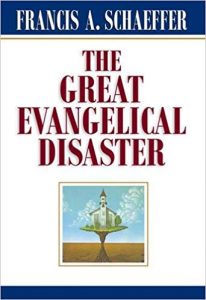Remember the “Parable of the Talents” in the New Testament? Christ exhorts us to be the best we can be by developing our skills and abilities, by succeeding in all our tasks and endeavors. What better description can there be of capitalism?
—Margaret Thatcher—
Key point: God’s fingerprints are all over the free enterprise economic model many people call capitalism.
In his landmark book, How Christianity Changed the World, Christian author, sociologist, historian, and cultural observer Alvin J. Schmidt declared,
Just as God does not want people to be coerced in spiritual matters, so too he does not want them to be coerced in earthly matters, for instance, in their economic activities. There is not a single reference in either the Old or New Testament in which God denies economic freedom to people, as in fascism, socialism, and communism (emphasis added).1
There is not a single reference in either the Old or New Testament in which God denies economic freedom to people, as in fascism, socialism, and communism.
—Dr. Alvin J. Schmidt—
With these definitions of key terms in mind, let’s begin to explore some of the qualities that mark the freedom God wants people to have in the economic arena—both from individual and societal, or corporate, perspectives. Is the free enterprise economic model compatible with biblical teachings? Any objective observer will answer this question with a resounding yes!
Key terms:
-
 Socialism is “an economic system based upon governmental or communal ownership of the means of production and distribution of goods and services.”2
Socialism is “an economic system based upon governmental or communal ownership of the means of production and distribution of goods and services.”2
- Socialism is a component of Marxism, which is “an atheistic and materialistic worldview based on the ideas of Karl Marx that promotes the abolition of private property, public ownership of the means of production (i.e., socialism), and the utopian dream of a future communistic state.”3
- Communism is “the Marxist ideal of a classless and stateless utopian society in which all property is commonly owned and each person is paid according to his or her abilities and needs.”4
- Capitalism or free enterprise is “an economic system in which capital assets are privately owned, and the prices, production, and distribution of goods and services are determined by competition within a free market.”5
- Social justice, also known as economic justice, is a term describing the redistribution of wealth supposedly for the common good of all. However, this comes at the expense of wage earners and liberty by demanding a society to conform. Those who work and have must give to those who don’t work and don’t have.
The Freedom Upon Which the Free Market Depends Is Biblical

The following paragraph appears in an article posted on the Summit Ministries website and titled “Socialism, Capitalism, and the Bible.” It debuted in 1985 in Imprimis, a publication of Hillsdale College. The paragraph provides an excellent guide for us to follow as we explore the compatibility between biblical teachings and a free market economic model.
Capitalism is not economic anarchy. It recognizes several necessary conditions for the kinds of voluntary relationships it recommends. One of these presuppositions is the existence of inherent human rights, such as the right to make decisions, the right to be free, the right to hold property, and the right to exchange what one owns for something else. Capitalism also presupposes a system of morality. Capitalism should be thought of as a system of voluntary relationships within a framework of laws which protect peoples’ rights against force, fraud, theft, and violations of contracts. “Thou shalt not steal” and “Thou shalt not lie” are part of the underlying moral constraints of the system. Economic exchanges can hardly be voluntary if one participant is coerced, deceived, defrauded, or robbed.

Dr. Ronald Nash, the author of the article, has succinctly summarized the human freedom that is both 1) a benefit of a free enterprise market economy and 2) a component upon which it depends.
Significantly, in this paragraph, Nash cites several biblical tenets that, by its very nature, a free market upholds.
First, he notes, “Capitalism is not anarchy.” This is vitally important for Christians to understand. The freedom of free enterprise isn’t random or chaotic, but purposeful and ordered—and it is ordered in a manner that gives people freedom to pursue their interests, develop their skills, use their talents, find satisfaction, and yes, even change their minds. Moreover, the free market model fits well with and can operate smoothly alongside government, whose leaders
Romans 13:3 are not a terror to good works, but to evil. Do you want to be unafraid of the authority? Do what is good, and you will have praise from the same. 4 For he is God’s minister to you for good. But if you do evil, be afraid; for he does not bear the sword in vain; for he is God’s minister, an avenger to execute wrath on him who practices evil.

The apostle Peter echoed what Paul said in Romans 13. Agents of the government “are sent…for the punishment of evildoers and for the praise of those who do good.” And as Paul directed Timothy in 1 Timothy 2:1-2, “I exhort first of all that supplications, prayers, intercessions, and giving of thanks be made for all men, for kings and all who are in authority, that we may lead a quiet and peaceable life in all godliness and reverence.” The order the government is divinely assigned to maintain is part of the stable environment necessary in a productive free market economy.
We are emphasizing here that capitalism allows people to act freely and strategically to work, produce, and profit from their labors. In themselves, these actions are neither sinful nor illegal. They actually are good, although sinful humanity, of course, can distort and misuse good gifts, opportunities, and resources. Even so, in Deuteronomy 8:18, Moses told the Israelites, “[Y]ou shall remember the Lord your God, for it is He who gives you power to get wealth, that He may establish His covenant which He swore to your fathers, as it is this day.”
And you shall remember the Lord your God, for it is He who gives you power to get wealth, that He may establish His covenant which He swore to your fathers, as it is this day.
—Moses to the Israelites in Deuteronomy 8:18—

Working for profit, therefore, isn’t inherently wrong. Working to benefit oneself isn’t necessarily a manifestation of greed. It can represent, and usually does, accepting the mantle of responsibility, acting so as not to have to rely on society or other individuals for basic needs. Margaret Thatcher said, “We need to create a mood where it is everywhere thought morally right for as many people as possible to acquire capital.” The beauty of a free enterprise economy is that when the worker, the supervisor, the manager, the entrepreneur, and the CEO voluntarily do their jobs well, they’re not the only ones who benefit. Others—people who use their company’s services and/or products—benefit as well. None of this activity is disruptive, nor is any of it forced. And all of it contributes to order, stability, and progress in society.
We need to create a mood where it is everywhere thought morally right for as many people as possible to acquire capital.
—Margaret Thatcher—
Second, Nash observes that capitalism “recognizes several necessary conditions for the kinds of voluntary relationships it recommends.” Do not miss that the “relationships it [capitalism] recommends” are voluntary. People participate as they wish, not as they are coerced. Remember the observations we cited at the outset from Dr. Alvin Schmidt:
Just as God does not want people to be coerced in spiritual matters, so too he does not want them to be coerced in earthly matters, for instance, in their economic activities. There is not a single reference in either the Old or New Testament in which God denies economic freedom to people, as in fascism, socialism, and communism (emphasis added).6

Have you stopped to consider this freedom and what your life would be like without it? How valuable is this freedom to you? No, you can’t do absolutely everything you may want to do. Certain limitations, such as not having enough money to buy your first-choice car or computer, prevent you from taking first-choice actions. Yet within the free market economy, you are the one in charge! You can work to reduce your limitations! One day, that car won’t be so far out of reach! Risk is involved, of course. You may not succeed. Yet, if government intervened to ensure your success, it also would limit your freedom and prevent you from reaching your fullest potential.
Elsewhere in his article, Dr. Nash writes about what he calls “interventionism.” He describes it as a “hybrid” between socialism and capitalism. Elaborating, he says,
One dominant feature of capitalism is economic freedom, the right of people to exchange things voluntarily, free from force, fraud, and theft. Socialism, on the other hand, seeks to replace the freedom of the market with a group of central planners who exercise control over essential market functions. There are degrees of socialism as there are degrees of capitalism in the real world. But basic to any form of socialism is distrust of or contempt for the market process and the desire to replace the freedom of the market with some form of centralized control. Generally speaking, as one moves along the continuum of socialism to capitalism, one finds the following: the more freedom a socialist allows, the closer his position is to interventionism; the more freedom an interventionist allows, the closer his position is to capitalism. The crux is the extent to which human beings will be permitted to exercise their own choices in the economic sphere of life.
In other words, regardless of intentions, the greater the intervention to control the economy centrally, the less freedom people have. Nash continues, saying interventionism is “a hopeless attempt to stop on a slippery slope where no stop is possible.” Typically when a free market experiences hiccups or bumps in the road, the market can and will correct itself—if it is allowed to do so.

Third, one of the conditions Nash cites for the free market to operate well is “the existence of inherent human rights,” or “unalienable Rights,” as the Declaration of Independence calls them. As Americans, we recognize that this tenet is one of or country’s founding principles. Further, as Christians, we believe this principle is biblical. When God created human beings, He made them in His image. This affirms the dignity of every human being and an individual’s personal sovereignty within reality’s limits and the limits of God’s law. This also means people have the specific rights Nash goes on to name. We’ll begin looking at those momentarily, when we consider the fifth item.
Fourth, it is no coincidence that in Genesis 1:26-28, in the very context of describing how human beings are God’s highest creation, the inspired writer says, “God blessed them, and God said to them, ‘Be fruitful and multiply; fill the earth and subdue it; have dominion over the fish of the sea, over the birds of the air, and over every living thing that moves on the earth’” (v. 28). This divine command often has been called the cultural commission. Not accidentally, it can be best fulfilled, by Christians and non-Christians alike, in the context of a free market economy.
Fifth, people have “the right to make decisions.” This principle, as we have seen so clearly already, is thoroughly biblical. While Scripture encourages people to make wise decisions, and while some decisions have adverse consequences and others have beneficial ones, people ultimately are free to act as they wish. In these ten Bible passages, readers are encouraged, commanded, and warned to work diligently and well, to avoid laziness, and to act responsibly overall. In these seven parables of Jesus, we not only observe economic activity within the context of a free market economy, but we also see expectations placed on workers and managers consistent with those employed in a free economic framework. Technically, throughout Scripture, the free market economic structure isn’t recommended; it is assumed. With this assumption, Scripture upholds the free market model over all others in the strongest possible way.

Sixth, Nash acknowledges that “the right to be free” is essential to a free market economy. Significantly, in Matthew 20:15, in the parable of the vineyard workers, Jesus indicated the hiring landowner asked an important rhetorical question: “Is it not lawful for me to do what I wish with my own things?” This, too, assumes a free enterprise approach. Also in the same parable, workers who were hired were free to work for the wages offered or to turn down the landowner’s offer to hire them, as they wished. Once they agreed to do so, they were obligated; but they were obligated, not by force, but by their own choices and agreements.
Is it not lawful for me to do what I wish with my own things?
—Jesus in Matthew 20:15, relating the words of the hiring landowner in the parable of the vineyard workers—

Seventh, “the right to hold property” is an inherent human right that is essential if the free enterprise system is going to work. We see the right to own and manage one’s property throughout Scripture. Most notably, we see it embedded in the Ten Commandments. “You shall not steal,” the Eighth Commandment, and “You shall not covet,” the Tenth Commandment, are clear affirmations of property rights. Note carefully how the Tenth Commandment reads in its entirety:
You shall not covet your neighbor’s house; you shall not covet your neighbor’s wife, nor his male servant, nor his female servant, nor his ox, nor his donkey, nor anything that is your neighbor’s (emphases added).
How many possessive nouns and pronouns do we see in this commandment? Seven, and the seventh is all-inclusive.

The Founders of America understood that property rights were sacred. John Adams (1735-1826) said, “If ‘Thou shalt not covet,’ and ‘Thou shalt not steal,’ were not commandments of Heaven, they must be made inviolable precepts in every society, before it can be civilized or made free.” He also said, “The moment the idea is admitted into society that property is not as sacred as the law of God, and that there is not a force of law and public justice to protect it, anarchy and tyranny commence.”

Founding Father James Madison (1751-1836) is known as the Father of the Constitution. He declared, “Government is instituted to protect property of every sort…. This being the end of government, that alone is a just government which impartially secures to every man whatever is his own.”
This article provides additional helpful information about property rights affirmed in Scripture.
Eighth, “the right to exchange what one owns for something else” also is essential to free enterprise capitalism. We see evidence of this right throughout Scripture, even as early as Genesis 23:1-20 (esp. vv. 7-18). In this passage, Sarah had passed away and her widower, Abraham, was looking for a suitable place to bury her. Sarah died in Hebron in Canaan, and at the time, Abraham was a foreigner in that land (although God had promised to give the land to him and his descendants). Abraham was well respected, and the leaders in the area told him, “[Bury] your dead in the choicest of our burial places” (v. 6). Abraham indicated he was interested in using “the cave of Machpelah,” which was owned by “Ephron the son of Zohar” (vv. 8-9). He said, “Let him give [sell] it to me at the full price, as property for a burial place among you” (v. 9). Ephron offered to give Abraham “the field and the cave that is in it,” but Abraham emphasized he wanted to buy it (vv. 10-13). Ephron responded by saying the land was “worth four hundred shekels of silver” but added, “What is that between you and me? So bury your dead” (vv. 14-15). Verses 16-18 tell us,
16 And Abraham listened to Ephron; and Abraham weighed out the silver for Ephron which he had named in the hearing of the sons of Heth, four hundred shekels of silver, currency of the merchants.
17 So the field of Ephron which was in Machpelah, which was before Mamre, the field and the cave which was in it, and all the trees that were in the field, which were within all the surrounding borders, were deeded 18 to Abraham as a possession in the presence of the sons of Heth, before all who went in at the gate of his city.
In this early passage of Scripture, “the right to exchange what one owns for something else” is vividly evident. Note that Ephron’s offer to give Abraham the field and the cave is clear evidence he owned it and had control over it. Abraham respected Ephron’s property rights by paying him what the land was “worth” (v. 15). Furthermore, he didn’t coerce or beg Ephron to sell. In verse 15, a Hebrew word representing the English word worth actually isn’t present in the text—but the idea clearly is. Literally, the Hebrew text reads, “…the land four hundred shekels of silver.”

After “Abraham weighed out the silver for Ephron which he had named in the hearing of the sons of Heth” (v. 16) and paid him, the property was “deeded to Abraham as a possession” (vv. 17-18). Following the transaction, the money that previously had belonged to Abraham was Ephron’s, and the field that earlier been Ephram’s now belonged to Abraham.
It is difficult to overemphasize the importance of this passage of Scripture. Hear what historian David Barton says about it in the following clip from the February 6, 2020 episode of Walbuilders Live! The first voice you’ll hear will be that of co-host Rick Green.
Numerous early settlers in North America were heavily influenced by the Bible and the biblical principle of property rights. You can learn more from this expanded clip excerpted from the same WallBuilders Live! program.
Genesis 23:1-20, of course, is but one Bible passage. In the seven parables of Jesus we considered in our discussion of the fifth item on our list, “the right to exchange what one owns for something else” is a given. It’s a given in these passages as well. Note that in Acts 5:1-9, even when Ananias and Sapphira paid with their lives for lying to the Holy Spirit and the early church about the amount of money they had contributed, Peter affirmed their property rights. He said to Ananias,
Ananias, how is it that Satan has so filled your heart that you have lied to the Holy Spirit and have kept for yourself some of the money you received for the land? Didn’t it belong to you before it was sold? And after it was sold, wasn’t the money at your disposal? What made you think of doing such a thing? You have not lied just to human beings but to God (Acts 5:3-4 NIV).
There’s more. These three passages speak of “buying” intangible assets. While they are emphasizing the acquiring of spiritual treasures, the analogy used assumes individual sovereignty and the right of choice. Individual freedom prevails in both the economic arena and with regard to spiritual benefits; we saw this in the quote from Dr. Alvin Schmidt at the beginning of this article. While spiritual assets definitely can’t be bought with money—the passages make that clear—we do see the principles of freedom and ownership upheld.
Ninth, Dr. Nash observes, “Capitalism also presupposes a system of morality.” Mark it down. The kind of morality capitalism presupposes is exactly the kind Scripture commands.

These passages talk about the importance of accurate weights and scales in economic transactions, as well as integrity in general. This is the “system of morality” that keeps a free market economy from degenerating into chaos. On the positive side, it makes freedom work because it places a check on exploitation, abuse, and greed. Using his own words, Dr. Nash essentially says this in his next sentence: “Capitalism should be thought of as a system of voluntary relationships within a framework of laws which protect peoples’ rights against force, fraud, theft, and violations of contracts.” Then he adds, “‘Thou shalt not steal’ and ‘Thou shalt not lie’ are part of the underlying moral constraints of the system.” (You’ll note that these commands were included in the list of divine principles we cited at the beginning of this paragraph.)
Capitalism should be thought of as a system of voluntary relationships within a framework of laws which protect peoples’ rights against force, fraud, theft, and violations of contracts.
—Ronald Nash—
Tenth, Dr. Nash elaborates by making this negative observation. “Economic exchanges can hardly be voluntary if one participant is coerced, deceived, defrauded, or robbed.” While voluntary activities make free enterprise work, moral guidelines act to restrain all sorts of abuses—abuses that would hinder both personal freedom and productivity. In other words, the free market can only work its “magic” if the public recognizes and heeds moral restraints, which prevent exploitation.
 Our tenth consideration, therefore, is about balance—the delicate balance between order and liberty in a free market economy. In his last book, The Great Evangelical Disaster (1984), Francis Schaeffer wrote of this balance. He spoke of form on one hand, and freedom on the other.
Our tenth consideration, therefore, is about balance—the delicate balance between order and liberty in a free market economy. In his last book, The Great Evangelical Disaster (1984), Francis Schaeffer wrote of this balance. He spoke of form on one hand, and freedom on the other.
In our own country we have enjoyed enormous human freedom. But at the same time this freedom has been founded upon forms of government, law, culture, and social morality which have given stability to individual and social life, and have kept our freedoms from leading to chaos. There is a balance here between form and freedom which we have come to take as natural in the world. But it is not natural. And we are utterly foolish if we do not recognize that this unique balance which we have inherited from the Reformation thought-forms is not automatic in a fallen world. This is clear when we look at the long span of history. But it is equally clear when we read the daily newspaper and see half the world locked in totalitarian oppression.7
Where do we find the right balance between order and liberty, or, in Schaeffer’s words, the proper balance between “form and freedom” that is so essential to a free market economy? The answer is clear. We find it in God’s Word. Moreover, history testifies that our founders, as well as until recently our nation’s leaders, have upheld this balance as essential.
The Bottom Line
Recognizing the alignment between Scripture and the principles that make capitalism work, Dr. Nash concludes his article with these important statements.
Little can be done to prevent human beings from wanting to be rich. But what capitalism does is channel that desire into peaceful means that benefit many besides those who wish to improve their own situation.
Which choice then should I, as a Christian, make in the selection between capitalism and socialism? Capitalism is quite simply the most moral system, the most effective system, and the most equitable system of economic exchange. When capitalism, the system of free economic exchange, is described fairly, there can be no question that it, rather than socialism or interventionism, comes closer to matching the demands of the biblical ethic.
Capitalism is quite simply the most moral system, the most effective system, and the most equitable system of economic exchange. When capitalism, the system of free economic exchange, is described fairly, there can be no question that it, rather than socialism or interventionism, comes closer to matching the demands of the biblical ethic.
—Ronald Nash—
I’ll go even further than Dr. Nash. While capitalism has its imperfections, the free enterprise model as he described it doesn’t merely align with biblical truth.
It rests on it.
Review:
- Capitalism, which Nash rightly contends “is not economic anarchy,” is maintained in the context of an ordered freedom that Scripture upholds and makes possible.
- The “voluntary relationships” and the voluntary involvement of individuals that make capitalism work are antithetical to government orchestration of private decisions and actions. Scripture affirms personal freedom in the economic realm.
- A free enterprise economic model rests on the principle that people have “inherent human rights” consistent with their having been created by God “in His image.”
- In the context of a free market economy, workers and supervisors, buyers and sellers, producers and consumers—all who participate—can act to fulfill the cultural commission God gave the human race in Genesis 1:28.
- Both capitalism and Scripture affirm the individual sovereignty of human beings, including “the right to make decisions.”
- “The right to be free” also is an integral part of free enterprise—and a right upheld in God’s Word.
- “[T]he right to hold property” is an inherent, God-given right and a principle on which the United States of America was founded. We see property rights affirmed in numerous places in Scripture. The Eighth and Tenth Commandments (Ex. 20:15,17) are foundational biblical principles for property rights.
- “[T]he right to exchange what one owns for something else” is another linchpin principle making capitalism work. Moreover, we see it clearly in the Bible—in many places.
- The “system of morality” that “[c]apitalism…presupposes” is entirely biblical.
- The delicate balance between order and liberty so necessary for the smooth operation of the free market is recognized in Scripture. Furthermore, Scripture provides the means for maintaining this balance. We see evidence of a clear understanding of this truth in American history, but sadly, we’ve apparently forgotten it today. We need to recover this understanding and embrace it once again.
These ten principles are available in a reproducible list here.
Concluding quotes:
Only when the human spirit is allowed to invent and create, only when individuals are given a personal stake in deciding economic policies and benefiting from their success—only then can societies remain economically alive, dynamic, prosperous, progressive and free.
—Ronald Reagan—
To be free is better than to be unfree—always. Any politician who suggests the opposite should be treated as suspect.
—Margaret Thatcher—
The left works 24/7 to disseminate its destructive ideas.…Leftists have to lie to persuade people that socialism works and capitalism is evil. At some point, we must successfully make the case that the left must be judged by its policy failures rather than its supposedly good intentions.
—David Limbaugh—
Capitalism works better than it sounds, while socialism sounds better than it works.
—Richard Nixon—
History tells us that the threat to prosperity is not debt but socialism.
—George Guilder—
Enough generations of socialist policies have now passed for us to judge their effects. They are bleak. Socialism undermines the character of a nation and of its citizens. In simpler words, socialism makes people worse.
—Dennis Prager—
Modern society is hypnotized by socialism. It is prevented by socialism from seeing the mortal danger it is in. And one of the greatest dangers of all is that you have lost all sense of danger, you cannot even see where it’s coming from as it moves swiftly towards you.
—Aleksandr Solzhenitsyn—
Socialism of any type leads to a total destruction of the human spirit.
—Aleksandr Solzhenitsyn—
No, the Bible does not teach socialism. What the Bible teaches is freedom and responsibility and work. And we are jettisoning all of these in the socialistic state.
—D. James Kennedy—
Copyright © 2020 by B. Nathaniel Sullivan. All rights reserved.
Unless otherwise indicated, Scripture has been taken from the New King James Version®. Copyright © 1982 by Thomas Nelson, Inc. Used by permission. All rights reserved.
Scripture references cited in this article marked NIV have been taken from The Holy Bible, New International Version®, NIV® Copyright © 1973, 1978, 1984, 2011 by Biblica, Inc.® Used by permission. All rights reserved worldwide.
top image credit: Lightstock
image credit: Dr. Ronald Nash
Notes:
1Alvin J. Schmidt, How Christianity Changed the World, (Grand Rapids: Zondervan, 2004), 205.
2Jeff Myers and David A. Nobel, Understanding the Times: A Survey of Competing Worldviews, (Manitou Springs, CO: Summit Ministries, 2016), 100.
3Ibid.
4Ibid.
5Ibid.
6Schmidt.
7Francis Schaeffer, The Great Evangelical Disaster, (Westchester, IL: Crossway Books, 1984), 21-22.
